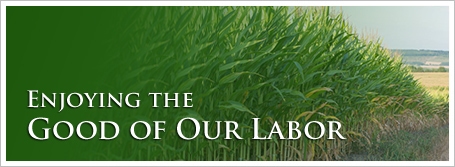The weeds had nearly overtaken the garden; yet amid these intruders stood some hearty beanstalks, squash vines, and strawberry plants. The young gardener set about clearing the weeds, and soon a pleasing array of plants emerged. Wiping away beads of sweat, the young cultivator viewed the garden bed with satisfaction, bending down to pick a ripe strawberry. As he bit into the sweet fruit, he recalled God’s words in I Timothy 5:18: “…The labourer is worthy of his reward.”
In our world today, there is a tangled mass of ideas revolving around work, wealth, and welfare. It is easy to be tossed to and fro by all of these ideas. In the pages of the Bible, the Word of God, are simple truths that can untangle many points of confusion. God’s Word shows us that He wants people to enjoy life in all its abundance, which includes material prosperity. God’s plan for man’s prosperity is for him to work and to enjoy the good of his labor.
From the beginning, God planned for man to work.
Genesis 2:15:
And the Lord God took the man, and put him into the garden of Eden to dress it and to keep it.
After God formed Adam (Genesis 2:7), He put him in the garden to dress it and to keep it. To “dress it” means to labor in it, and to “keep it” means to diligently protect it. Adam was given a job to do from the very start! This was one of God’s guidelines for prosperity. As Adam kept the garden, God planned for him to enjoy the good of his labor.
Genesis 2:16:
And the Lord God commanded the man, saying, Of every tree of the garden thou mayest freely eat.
In contrast, the Bible also teaches that if a person is able but not willing to work, that person shouldn’t eat.
II Thessalonians 3:10:
For even when we were with you, this we commanded you, that if any would not work, neither should he eat.
This truth has stood the test of time. In fact, it played an integral role in the colonization of North America in the 1600s. At Jamestown, in what is now Virginia, many of the settlers were gentlemen who were unaccustomed to hard work. With the words “He who does not work, will not eat,” Captain John Smith warned the colonists that the idle would get no food. Heeding this admonition and following Captain Smith’s leadership helped to save the colony from being wiped out.
Work is a good thing. It is part of God’s plan for man, and so is enjoying the fruit of one’s labor. This is stated in many ways throughout the Bible.
II Timothy 2:6:
The husbandman [farmer] that laboureth must be first partaker of the fruits.
Ecclesiastes 5:18:
…it is good and comely for one to eat and to drink, and to enjoy the good of all his labour that he taketh under the sun all the days of his life, which God giveth him: for it is his portion.
God wants us to enjoy the good of our labor, to reap the harvest of our own efforts.
Contrary ideas about sharing goods and products from a common storehouse were tried in early American history, in the colony of Jamestown and also among the Pilgrim settlers in Plymouth Colony. In Jamestown, as long as colonists were expected to put their products into a common storehouse and draw what they needed from it, there was not much incentive to high production. But when individual farmers were allowed to become landowners and keep their own produce, production increased.
This was also the case in Plymouth. The common-storehouse idea was tried but did not work. It was found that those who worked hard were taken advantage of by the few who slacked off from work. To give the colonists an incentive, the decision was made to switch to private ownership of land.
According to The Light and the Glory by Peter Marshall and David Manuel, at Plymouth Colony in the 1600s, “…the principal men of the colony decided that there would be an additional planting. But for this second planting individual lots would be parceled out, with the understanding that the corn grown on these lots would be for the planters’ own private use.”
After one year of this procedure, Governor William Bradford was convinced of its success. The Light and the Glory records his observations: “…it made all hands very industrious, so as much more corn was planted than otherwise would have been…. The women now went willingly into the field and took their little ones with them to set corn, which before would allege weakness and inability, whom to have compelled would have been thought great tyranny and oppression.”
We can see from these historical examples that the Word of God works! It sets forth clear truths that have stood the test of time. Whether in centuries past or today, putting these truths into action brings forth abundant results. God’s will is for people to prosper in all categories, including the material realm; and God planned for us to work and to enjoy the fruit of our labor. What a joy it is to understand God’s plan for prosperity so we can live abundantly and enjoy the rewards of the work we do.

